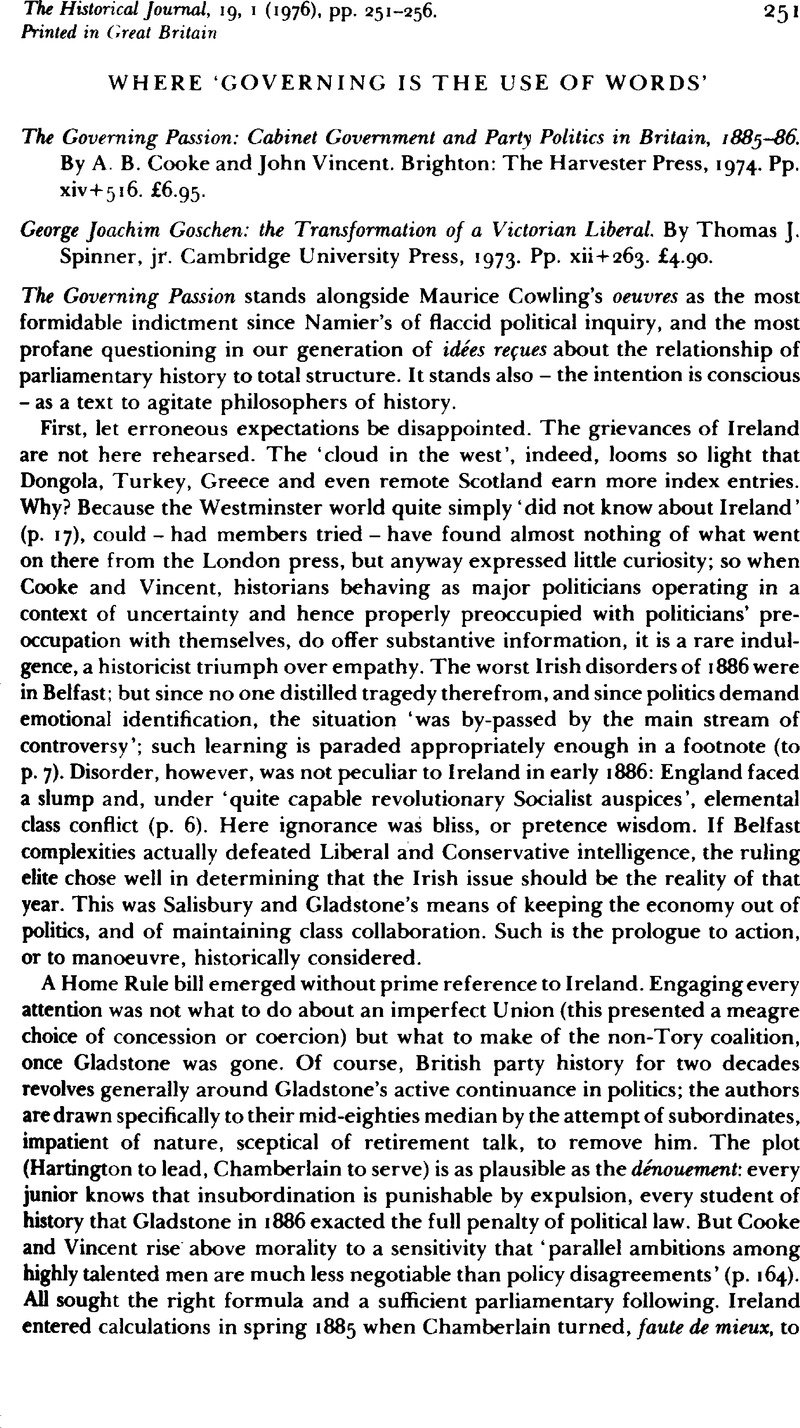Published online by Cambridge University Press: 11 February 2009

1 Bentley, Michael The Times Higher Educational Supplement, 8 Mar. 1974, p. iv.Google Scholar
2 The Liberal Imperialists: The Ideas and Politics of a Post-Gladstonian Elite (Oxford, 1973).
3 Cf. made, comments in my review article, ‘Liberal History’. Parliamentary Affairs, xxv f (1972). 351–4.Google Scholar
4 Sunday Times, 21 Apr. 1974.
5 Beales, Derek ‘Peel, Russell and Reform’, Historical Journal, xvll (1974), 873–82.Google Scholar
6 Peel, and the Conservative Party: a Study in Party Politics, 1832–1841 (London, 1929).Google Scholar
7 Norman Gash’s recognition of ‘the occupational hazard of every biographer’, English Historical Review, LXXXIII (1968), 362, in review of Robert Blake, Disraeli (London, 1966). 8 Beales, Historical Journal, xvn, 874.
9 Ibid., p. 875.
10 Butterfield, Herbert ‘Limits of Historical Understanding’, Listener, 26 June 1947, P. 997.Google Scholar
11 Collingwood, R. G.An Autobiography (Oxford, 1959 impr.), p. 110.Google Scholar
12 Oakeshott, MichaelRationalism in Politics, and Other Essays (New York, 1962), p. 90Google Scholar
13 Ibid., p. 164.
14 Harrison, Brian, New Society, 20 07 1972, pp. 146–7,Google Scholar in review of Jones, Andrew, The Politics of Reform 1884 (Cambridge, 1972).Google Scholar
15 The Politics, of Reform 1884, pp. 236–7.Google Scholar
16 Hinton, James ‘The Beginnings of Modern British Polities’, Bulletin of the Society for the Study of Labour History, no. 24 (Spring 1972), p. 65.Google Scholar
17 McKibbin, R. English Historical Review, xc (1975), 229.Google Scholar
18 The Times Literary Supplement, 22 Nov. 1957, p. 698.
19 Pelling, HenryCambridge Review, XCII (7 May 1971). 180–1, in review of Cowling, The Impact of Labour, 7920–1924 (Cambridge, 1971).Google Scholar
20 Hurst, Michael introduction to Charles Seymour, Electoral Reform in Englandand Wales vitn & (Newton Abbot, 1970 repr.).Google Scholar
21 Pelling, Cambridge Review, xcn, 181.
22 Sunday Times, 21 Apr. 1974.
23 Arthur Elliot, R. D. Life of George Joachim Goschen, First Viscount Goschen, 1831–1907 (2 vols.), with every justification devotes fewer pages to the years 1888–1907 than to 1885–7.Google Scholar
24 Diary, Goschen 20 Feb. 1878, cited in Elliot, 1, 187.Google Scholar
25 Ibid.
26 bid., 19 Feb. 1884, repeating this parliamentary catchphrase which he had borrowed from Smith, W. H. cited in Elliot, 1, 239.Google Scholar
27 Goschen, to Balfour, 21 06. 1895, cited in Spinner, p. 182.Google Scholar
28 Such things are discernible in Spinner’s tome, vying though in a biographical clutter which no organizational subtitle can disguise. Fanny, we are told (p. 47), ‘must have provided some consolation for a rather dreary Parliamentary year’. Did Goschen find 1875 dull? Did domesticities compensate? Or is it that Spinner announces a daughter’s birth only he to break embarrassingly long silence in the political record? 29 Elegant variation alone may have lured Smith into speaking of Goschen as ‘the Jew’.As a point of interest, it was Gladstone’s friend, Robert Farquharson, who put into print: ‘His nose betrayed him, he had the flat feet and the hoarse voice of the Israelite’. See Farquharson, In and Out of Parliament: Reminiscences of a Varied Life (London, 1911), p. 260.
30 M. R. D. Foot’s language English Historical Review, LXXXIX (1974), 228, in review of The Politics of Reform 1884.CrossRefGoogle Scholar
31 Butterfield, HerbertHistory and Human Relations (London, 1951), p. 12.Google Scholar
32 A Portion of the Journal Kept by Raikes, ThomasEsq., from 1831 to 1847 (London, 1856–1857), IV, 343–4.Google Scholar
33 Gladstone to his wife, 12 Oct. 1845, cited in Hammond, J. L.Gladstone and the Irish Nation (London, 1964 impr.), p. 51.Google Scholar